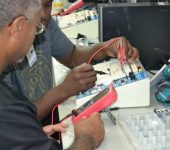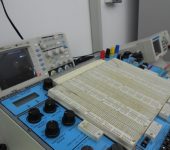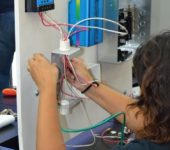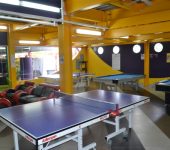Course Brief
Unit Abstract
An embedded system is a device or product which contains one or more tiny computers hidden inside it. This ‘hidden computer’, usually a microcontroller, is used to control the device and give it added ‘intelligence’. Embedded systems are a key aspect of modern engineering and are applied in areas as diverse as automotive, medical, and industrial, and in the home and office. In many cases,
embedded systems are linked together in networks. Embedded systems are the basis of a new wave of engineering design and practice, notably in machine-to machine communication and in the Internet of Things.
This unit builds on introductory knowledge students have already gained in electronic circuits. It develops their knowledge of computer hardware, focussing on the small, low-cost type of computer (i.e. a microcontroller), usually used in embedded systems. It then develops skill in devising circuits which operate external to the microcontroller and interface with it; generally, these relate to sensors, actuators, human interface or data transfer. In parallel with this, students will be
developing programming skills, writing programmes which download straight to the microcontroller and cause it to interact with its external circuit. Students will also explore the wider context of embedded systems, learning how they are applied in ‘hi-tech’ applications, in many cases revolutionising our ability to undertake certain activities.
Unit assessment will require the design, development, construction and
commissioning of an embedded system, meeting a given design brief; this will develop skills which are in much demand in industry. A written assignment, exploring one or more of the many fast-moving embedded system applications in use today, will also be completed.
- This course is offered in 45 hours.
-
BTEC Higher National Diploma (HND) in Engineering (Electrical and Electronic Engineering)
The Pearson BTEC Higher National Diploma (HND) in Engineering (Electrical and Electronic Engineering) will develop students into highly trained, competent professionals, who are able to meet the demands of employers in the various engineering sectors.
This qualification also serves as the next step for students completing the SBCS Diploma in Electrical and Mechanical Engineering Technology programme and are interested in pursuing the BEng (Hons) in Electrical and Electronic Engineering (Technology).
Why choose the HND in Engineering (Electrical and Electronic Engineering)?
- Recognition: This is an Internationally recognized qualification, recognized in more than 70 countries worldwide.
- Final Year Entry: Graduates of this programme gain direct access to the final year of the University of Greenwich's B.Eng. in Electrical and Electronic Engineering (Technology) programme offered at SBCS, Champs Fleurs campus.
- Career-focused: The curriculum was developed to meet the needs of the current marketplace after consultation with employers, students, and professional bodies.
- Practical hands-on training: Emphasis is placed on practical training and the application of the knowledge taught.
Why study Electrical and Electronic Engineering at SBCS?
- Instructors are certified, highly skilled and experienced practitioners who bring their knowledge and work experience to the classroom.
- Modern, fully equipped labs. You learn using the same equipment you will encounter in the field.
- Convenient class schedules. Work, Earn and Study at the same time. Classes are offered on a part-time basis, which allows working individuals to balance their work and educational needs.
Electrical and Electronic Engineering promo video

Our Labs




Our Campus




Schedule & Fees
The next intake for this offering will be in January 2025.
For more details on fees and courses Download the Programme Brief
FEE AMOUNT NOTE SBCS Registration Fee TT$850 each semester
Payable upon registration every semester (for 6 semesters) Tuition Fee TT$2,200 (per 15 credit module)
TT$4,400 (per 30 credit module)
Total Tuition Fee over 2 years: TT$35,200 BTEC Registration and Annual Fees £550
Payable by: February, 2025
Please note: All information provided is subject to change without prior notice.
What's Next?